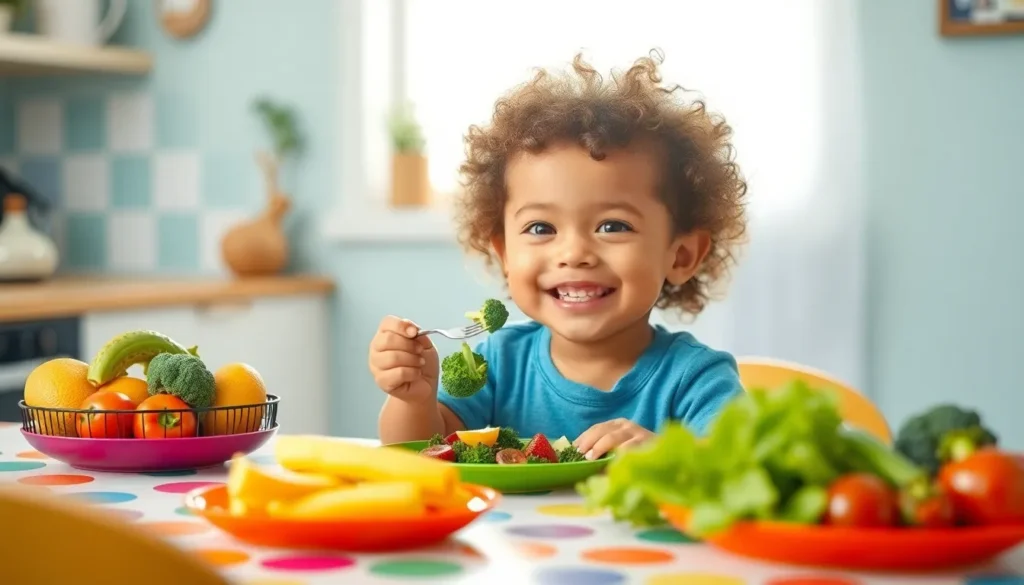Table of Contents
ToggleGetting a toddler to eat can feel like trying to negotiate with a tiny dictator. One minute they’re all about broccoli, and the next, they’re staging a full-blown protest against anything green. Parents everywhere know the struggle of turning mealtime into a battlefield, complete with food flinging and dramatic meltdowns.
Understanding Toddler Eating Habits
Understanding toddler eating habits involves recognizing specific behaviors and preferences. The unpredictability can be frustrating, but knowing the common challenges and nutritional needs helps parents navigate mealtimes.
Common Challenges
Toddlers often exhibit selective eating, where they refuse previously liked foods. Emotional outbursts frequently accompany mealtime, complicating the situation for caregivers. Building a routine can sometimes alleviate stress, ensuring familiarity during meals. Distraction techniques, like engaging toddlers with fun utensils or plates, might improve focus on food. Power struggles inevitably arise, as toddlers assert independence. Encouraging exploration without pressure can foster a positive relationship with food.
Nutritional Needs
Essential nutrients play a crucial role in a toddler’s growth and development. They require proteins, healthy fats, carbohydrates, vitamins, and minerals for optimal functioning. Iron is particularly vital; it supports cognitive development and energy levels. Calcium remains important for bone health, while vitamin D enhances calcium absorption. Each meal should include a balance of these nutrients to meet daily requirements. Offering a variety of foods ensures toddlers receive the necessary nutrition. Snack options, like fruits and vegetables, can also contribute to nutritional goals.
Creating a Positive Eating Environment

A positive eating environment encourages toddlers to engage with their meals. Creating a space where they feel comfortable is crucial for fostering healthy eating habits.
Setting the Scene
Start by choosing a well-lit area with minimal distractions. A clean table setting with colorful plates and utensils can enhance their interest in food. Soft background music might also create a pleasant atmosphere. Placing familiar foods beside new ones may encourage exploration. Keep mealtime consistent, as familiarity helps toddlers feel secure. A calm environment promotes openness to new flavors and textures.
Family Mealtime Rituals
Establishing family mealtime rituals strengthens connections and encourages participation. Sharing meals at the same time each day creates a routine that toddlers rely on. Utilize interactive activities like picking toppings for pizzas or assembling their own tacos. Allowing toddlers to help with meal preparation fosters pride in their food choices. Engaging in conversation about the day’s events invites them to share their thoughts. Together, these practices make mealtimes enjoyable, making toddlers more likely to try different foods.
Encouraging Healthy Choices
Encouraging healthy choices involves introducing new foods while engaging toddlers in the process. Both strategies can significantly improve their willingness to try different foods.
Introducing New Foods
Introducing new foods becomes easier with gradual exposure. Parents can start by presenting small portions alongside familiar favorites. Colorful fruits and vegetables attract attention and pique curiosity. Consistency matters, so reintroducing foods multiple times may spark interest. Use fun names or stories to make new foods more appealing. When a toddler sees others enjoying a food, they’re more likely to try it themselves. Creating a positive atmosphere during tastings invites exploration.
Involving Toddlers in Meal Prep
Involving toddlers in meal prep makes mealtime fun and educational. Toddlers can assist with simple tasks, such as washing vegetables or stirring ingredients. Such activities foster a sense of ownership and accomplishment. Parents should encourage toddlers to choose ingredients at the grocery store; this involvement increases excitement about meals. Utilizing age-appropriate tools allows toddlers to participate safely. When toddlers help with preparations, they tend to eat the final product with enthusiasm. Engaging them sparks their interest and builds lifelong healthy eating habits.
Managing Mealtime Dynamics
Creating a positive atmosphere during meals sets the stage for effective feeding. Small adjustments can significantly impact how toddlers engage with food.
Dealing with Refusals
When toddlers refuse food, maintaining calm is essential. Reactions can influence future willingness to try items. Providing a no-pressure environment encourages them to explore different flavors. Offer alternatives without strict expectations; this prevents anxiety around mealtimes. Consistent exposure to rejected foods fosters familiarity, increasing the chance they will eventually try them. Recognizing that preferences can change helps alleviate frustration. Each meal presents an opportunity for gradual acceptance.
Strategies for Picky Eaters
Engaging picky eaters requires creativity and patience. Making meals visually appealing can spark interest. Experiment with colorful presentations of fruits and vegetables to catch their eye. Pairing new foods with favorites reduces apprehension. Using creative names for dishes or involving them in food preparation can also enhance curiosity. Gradual exposure through multiple introductions helps build comfort. Recognizing small successes, like trying a bite or two, reinforces positive behavior. Establishing a routine around mealtime promotes security, making toddlers more open to diverse options.
Navigating the world of toddler eating can be a challenging journey for parents. By creating a positive and engaging mealtime environment, they can significantly improve their child’s willingness to try new foods. Involving toddlers in meal preparation and maintaining a consistent routine fosters a sense of ownership and security.
Parents should remember that patience is key. Encouraging exploration and celebrating small successes can transform chaotic mealtimes into enjoyable experiences. With the right strategies in place, it’s possible to help toddlers develop healthy eating habits that will last a lifetime. Embracing this adventure can lead to a happier and healthier relationship with food for both parents and their little ones.







